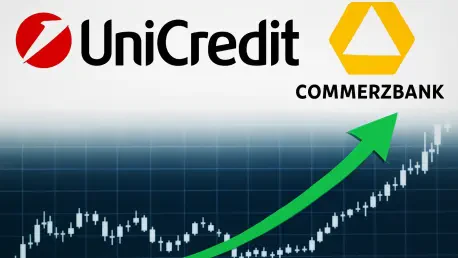I’m thrilled to sit down with Priya Jaiswal, a distinguished expert in banking, business, and finance, whose deep knowledge of market analysis, portfolio management, and international business trends offers invaluable insights into the latest developments in the financial sector. Today, we’re diving into the recent news of UniCredit increasing its equity stake in Commerzbank to 26%, a move that has sparked significant interest in the banking world. Our conversation will explore the motivations behind this strategic decision, the financial implications for shareholders, the dynamics of cross-border investments, and the potential future of this partnership amidst regulatory and political considerations.
Can you walk us through the key reasons behind UniCredit’s decision to boost its voting rights in Commerzbank to 26% at this specific moment?
Certainly, Natalie. UniCredit’s move to increase its stake to 26% in Commerzbank is a strategic play to solidify its position as the largest shareholder in one of Germany’s key financial institutions. This decision likely stems from a combination of long-term growth objectives and favorable market conditions. By converting a portion of its synthetic position into physical shares, UniCredit is signaling confidence in Commerzbank’s value and potential synergies between the two banks. Timing-wise, it could be linked to internal financial restructuring or a calculated step to strengthen influence ahead of broader European banking consolidation trends.
How does the process of converting synthetic positions into physical shares contribute to this increase, and what does it mean for UniCredit’s control?
Converting synthetic positions—essentially financial instruments that mimic ownership without holding actual shares—into physical shares gives UniCredit direct voting rights and a tangible stake in Commerzbank. This shift enhances their influence over strategic decisions without necessarily altering the day-to-day operations. It’s a way to move from a passive to a more active investment stance, securing a stronger foothold while still navigating the sensitivities around a full takeover, especially given Germany’s historical reservations.
With UniCredit planning to further increase its stake to about 29%, can you shed light on what this conversion process might look like and any challenges they could face?
The planned increase to 29% involves converting the remaining synthetic positions into physical shares, a process that requires regulatory nods, particularly from the European Central Bank, which has already cleared UniCredit for up to 29.9%. The timeline depends on market conditions and internal approvals, but it’s likely to happen in the near term, assuming no major roadblocks. Challenges could arise if share prices fluctuate significantly or if there’s pushback from German stakeholders, though the ECB clearance mitigates much of the regulatory risk.
Germany has historically opposed a full takeover of Commerzbank by UniCredit. How do you think this latest stake increase impacts that ongoing tension?
This increase to 26%, and the planned jump to 29%, certainly keeps the conversation alive about UniCredit’s intentions. While it doesn’t equate to a full takeover, it’s a clear step toward greater influence, which might heighten Germany’s concerns about losing control over a domestic banking giant. However, since UniCredit isn’t seeking board representation right now, it may be seen as a less aggressive move. The dynamic remains delicate, and ongoing dialogue with German authorities will be crucial to avoid escalating tensions.
Commerzbank has stated that this stake increase doesn’t fundamentally change their situation and they’re focused on growth. How do you interpret their response, and what might UniCredit think of this stance?
Commerzbank’s response suggests they’re trying to downplay the significance of UniCredit’s move, focusing instead on their independent growth strategy. It’s a way to reassure stakeholders that their core mission hasn’t shifted. From UniCredit’s perspective, they might view this as a neutral or expected reaction, though privately, they could be hoping for more openness to collaboration. It’s likely UniCredit sees this as just one step in a longer journey toward deeper integration, even if Commerzbank isn’t ready to acknowledge that yet.
UniCredit has mentioned they don’t intend to seek board representation ‘at this time.’ What do you think they mean by that, and under what circumstances might they change their mind?
The phrase ‘at this time’ is deliberate—it leaves the door open for future board involvement without committing to a timeline. UniCredit is likely being cautious to avoid provoking German opposition or regulatory scrutiny while still building their stake. They might consider seeking representation if their ownership nears a threshold like 30%, or if strategic decisions at Commerzbank require more direct input to protect their investment. It’s a wait-and-see approach, balancing ambition with diplomacy.
Financially, UniCredit has reported a strong 20% return on this investment. Can you break down how this creates value for their shareholders and what metrics stand out to you?
A 20% return on investment is a significant win for UniCredit shareholders, reflecting both capital appreciation and strategic positioning. This figure likely comes from a mix of rising share prices at Commerzbank and the effective structuring of their initial investment, including derivatives. Key metrics here include the CET1 ratio impact, which has risen due to higher costs but still supports financial stability, and the reduced volatility in their hedging strategy. For shareholders, this translates to confidence in UniCredit’s ability to generate value through cross-border investments, potentially paving the way for higher dividends or reinvestment in growth.
Looking ahead, what is your forecast for the future relationship between UniCredit and Commerzbank, especially considering the broader trends in European banking?
I think the relationship will continue to evolve with cautious optimism. European banking is trending toward consolidation to compete globally, so UniCredit’s stake in Commerzbank could be a precursor to deeper ties, whether through partnerships or, eventually, a full merger if political barriers ease. However, much depends on Germany’s stance and regulatory frameworks in the coming years. We might see UniCredit push for more influence through subtle means, like strategic alliances, before any overt moves for control. It’s a space to watch closely as the European financial landscape shifts.









